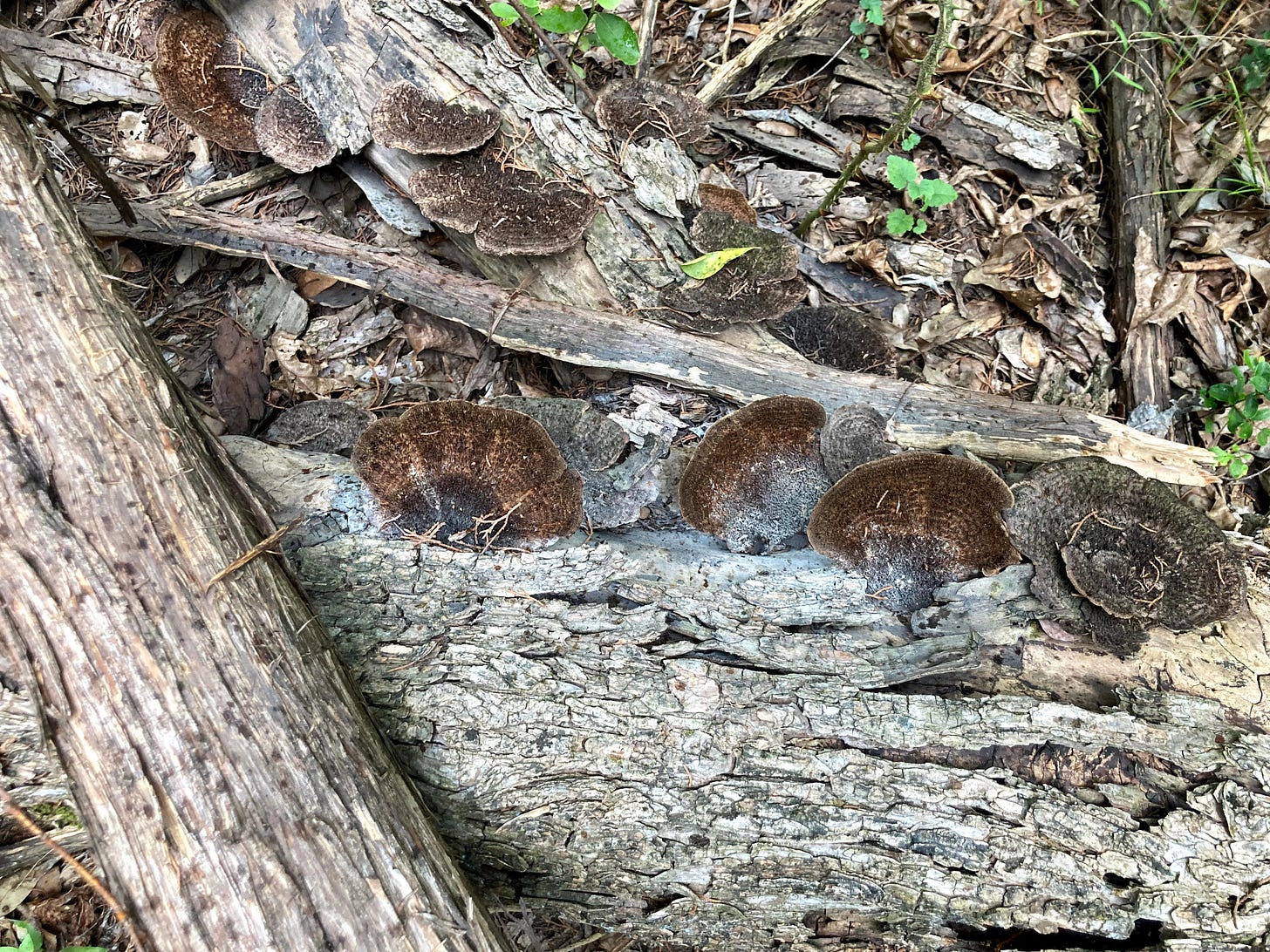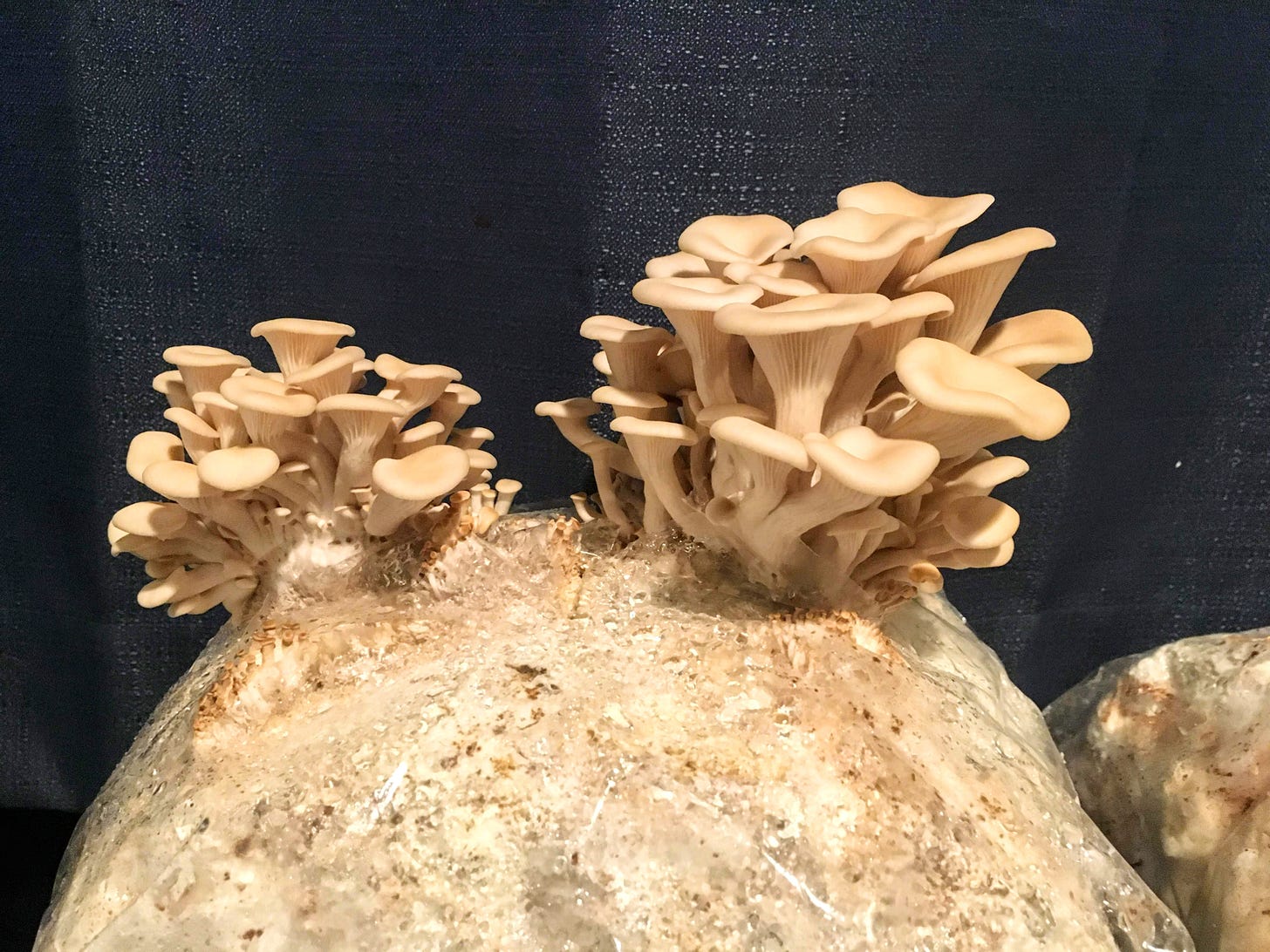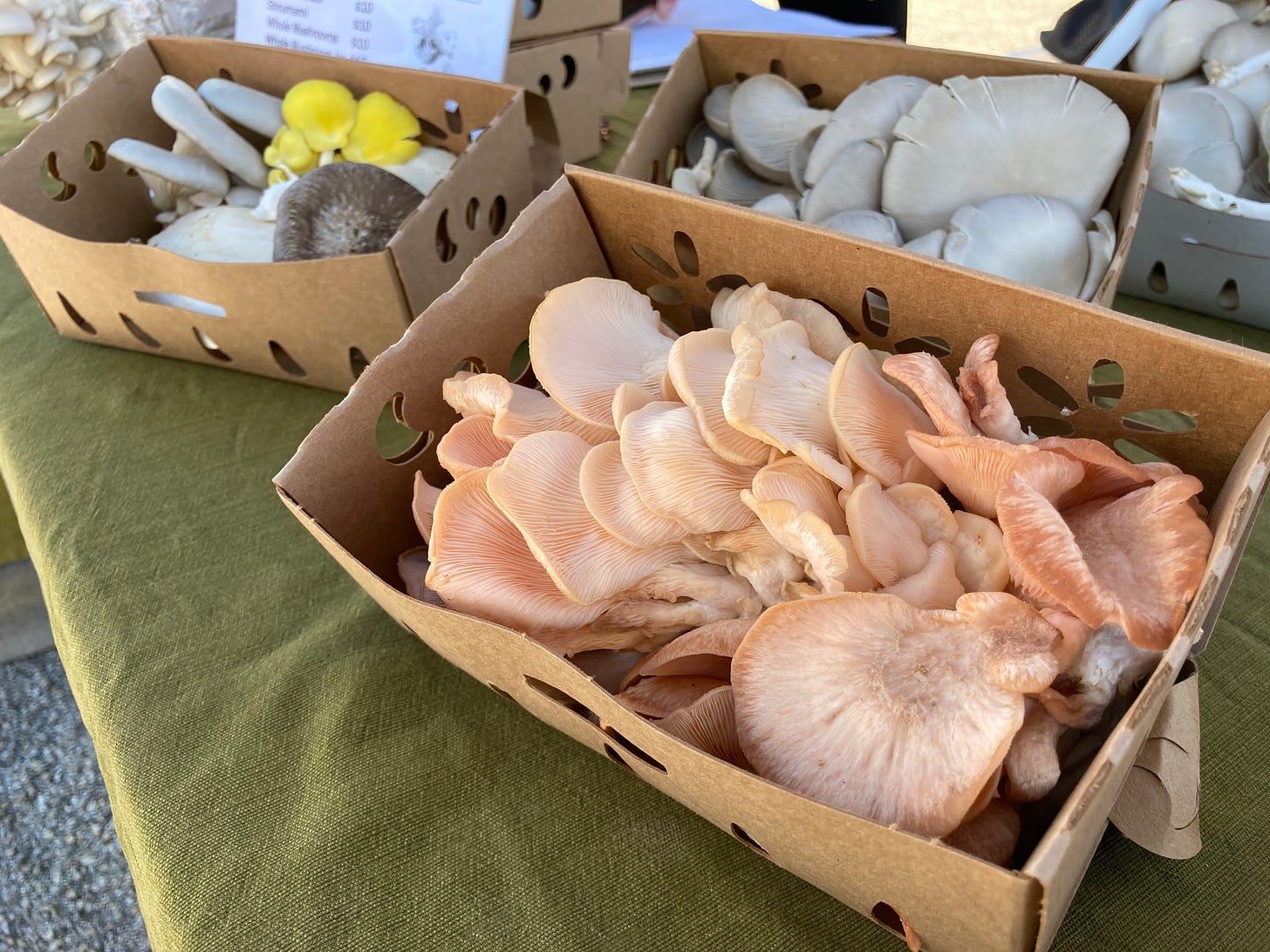Chicken of the woods season is coming up. Are you ready?
The Central Texas Mycological Society has boomed during the pandemic. Here’s why.

I’ve been hiking on the Barton Creek Greenbelt since I moved to Austin, but I’d never been on a hike like this.
It was late July — steamy but cool by Austin standards — and a group of us were walking along a part of this South Austin trail I hadn’t been on, looking carefully at the ground.
We were looking for a red orchid, more specifically, a myco-heterotrophic orchid, Hexalectris nitida or Glass Mountain Coralroot, whose survival depends on fungi.
It turns out, all of our survival depends on fungi, says Angel Schatz, who co-leads these sold-out hikes with the Central Texas Mycological Society, a group that started in 2019 and has thrived during the pandemic.
The organization hosts hikes, virtual meetings and outdoor happy hours to bring together Central Texans, like me, who are curious about mushrooms.
Austin’s mushroom scene has boomed in the past 10 years, with HiFi Mycology, Small Hold and newcomers, such as Marysol’s Mushrooms, all selling mushrooms and mushroom-growing kits to local fungi lovers.
(The food writer historian in me will also point out that the well-established Kitchen Pride brand, founded in 1988 outside San Antonio, has been selling mushrooms at both Walmart and local farmers market for years, a feat unmatched by any other local consumer packaged goods brand.)
But it’s only been the past two years that Central Texas Mycological Society has become A Thing. As in, A Thing that can draw 25 people to a weeknight happy hour when it’s 95 degrees outside. (More about that magical meet-up in a moment…)
Musical mushrooms
My first CTMS event was that hike a month ago, which culminated with nearly two dozen budding mycologists gathered around an area where a handful of small, thin maroon stalks, all less than a foot tall, were camouflaged enough not to draw attention to themselves.
But soon, they were the stars of the show.
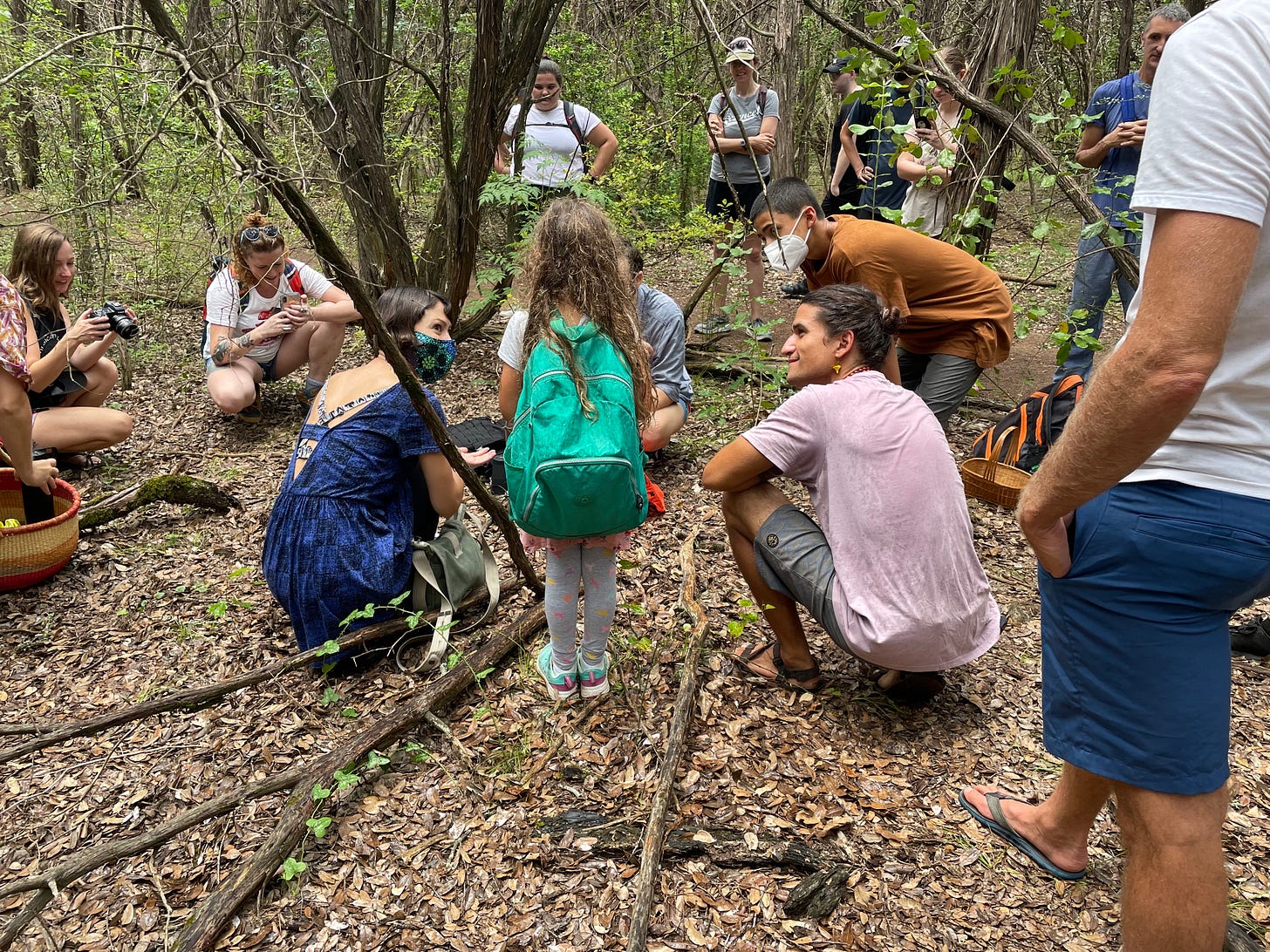
Two members of the Austin-based band the Octopus Project were on the hike, and they brought a few pieces of music-making equipment I’d never seen before, including an electronic sensor that “plays” the electricity coursing through the organism.
Earlier this summer, the Octopus Project put on a whole concert of music “made” with mushroom colonies. We missed that show, but this Saturday afternoon, we witnessed one happening in real time.
All 20-plus of us, sweating in the humid Texas heat, listening to these pleasant ethereal electronic sounds coming from a laptop set up next to the plant. No melody. No drumbeat. Just an ebb and flow of sound.
A little girl on the tour became entranced by the performance. “What is happening?” she asked, crouching down beside the orchid. We laughed because we wondered the same thing.
‘Never not looking for mushrooms’
Standing nearby was Schatz, an organizer of the event, one of more than a dozen hosted by the organization this year. Schatz is a digital marketing strategist who volunteers her time to spread the good word about mushrooms because, well, she loves them..
“I’m never not looking for mushrooms,” she said recently.
Schatz got involved after meeting the founders at MycoFest, an annual celebration of eukaryotic organisms, aka mushrooms, that takes place in Pennsylvania each year.
She loves foraging for fungi to eat, but for Schatz and many other members of the group, the fascination stems from their versatility and variability.
She grew up outside St. Louis foraging morels with her grandfather and uncle, and the nostalgia of that act — wandering through the woods with a singular focus in mind — pulled her into the YouTube fungi rabbit hole. “I didn’t really think that Central Texas would have an abundance of fungi,” she says, but she found videos of people foraging for morels in Texas.
Her quest began.
When the pandemic hit, she found herself out in nature more than ever — and her first Texas morels. (Like any good mycologist, she keeps some secrets about where she finds certain mushrooms to avoid over-harvesting.)
Schatz, a longtime member of Austin Organic Gardeners, as well, now helps program the events with Sam McChesney, who goes by Sam the Fungi.
McChesney was part of the group when they were first meeting in libraries to talk about what kind of a group they wanted to create, and the group has evolved to function more like a fungi, with circles of leadership, not a hierarchy.
McChesney has been going by “Sam the Fungi” for a couple of years now, and it’s a nickname his friends gave him because all he talked about was mushrooms. “I do feel like I’m a mushroom,” he says.
He discovered the potency of mushrooms after having a stomach issue in his teens that only eased after he started consuming ganoderma lingzhi, otherwise known as reishi, which has been used for more than 2,000 years in Chinese medicine.
“I felt like I was on a path that was leading me to death, and the mushroom brought me back to life and joy.”
Growing the group, block by block
McChesney is now a mycoconsultant, which means he sets up mushroom grow operations and waste reduction systems for individuals and companies.
Some of those companies, including HiFi and Small Hold, which now sells at H-E-B, Central Market and Whole Foods, sell a wider variety of mushrooms to a wider audience, not to mention those grow-your-own blocks, which have become a big draw for newcomers to CTMS.
McChesney connected the group with some of these local mushroom companies to help them get rid of their extra mushroom blocks, which the group now gives away for free at its events.
“The block giveaway was the gateway drug for a lot of people,” Schatz says. “We really wanted to help divert waste from the landfill, but people were like ‘Holy crap, I get to take this?’ At that point, all the work is already done for you.”
The grow-your-own blocks give people something to do during the pandemic, and growing mushrooms gets them start thinking about permaculture, healthy soil and plant biodiversity in their own yards. Maybe that will lead to changing how we think about our food system, too. That’s a win, if you ask folks like Schatz and Sam the Fungi.
“People have felt like they don’t have control,” Schatz says. “This is something they can be active with. People want immediate gratification, and with the mushrooms, you can see something happen so quickly. [The mushrooms] are communicating back to you, and then you can recycle the block when it’s finished. That’s some feel-good dopamine.”
Fighting mycostigma and mycophobia
Life exists because of mushrooms, Schatz says, but most people are scared of them because they think mushrooms will kill them or make them high.
Even though books like Michael Pollan’s 2018 bestseller “How to Change Your Mind” have demystified some aspects of psychedelic mushrooms, both Schatz and McChesney say that mycostigma is present in almost every conversation with newcomers or people who don’t know much about mushrooms.
“We get our psychonauts,” Schatz says, referring to the people who are interested primarily in psilocybin, or psychedelic, mushrooms. “I’m interested in the anthropological and historical research of mushrooms and how they’ve been used and depicted for thousands of years.”
People are more accustomed to eating mushrooms these days from grocery stores, but there’s a widespread fear of eating them in the wild. Mushroom foragers say that knowing how to properly identify the edible ones isn’t as difficult as most people imagine, but in some ways, the stigma and curiosity has never been higher.
With a number of high-profile mushroom documentaries streaming online, including “Fantastic Fungi” on Netflix, many people are flocking to mycology. “We’re going through a shroom boom,” she says. “The popularity of all of these films is part of it, but also everyone is slowing down, too, because of the pandemic.”
McChensey says that the group’s goal is to start a school-based education program that could include a mobile lab with microscopes and equipment so young people can look at spores, break apart mycelium blocks and get an introduction into their impact on nature, medicine and even culture and society.
“We’re a mycophobic culture,” she says. “We’ve got a lot of work to do. We want to help people see all the magic, not just the magic mushrooms.”
Fungi & friends
At one of the group’s happy hours recently, a motley mushroom gang gathered around two large picnic tables. Retirees with master naturalist certifications. A tattooed couple from San Antonio. New-to-Austin millennials who were exchanging numbers by the end of the night.
Members pay $25 a year to join the group, and organizers keep in touch through a newsletter, Instagram and Facebook.
The buzz in the air was palpable. Austin’s weirdness, on full display. Friendships forming as naturally as those turkey tails sprouting from rotting logs on the trail.
Schatz says that volunteering for the group has “given me life during this pandemic,” she says.
“Seeing people’s eyes light up when they can hang out and talk about mushrooms makes it all worth it. When you can find your people and talk about what you love, there’s so much joy.”
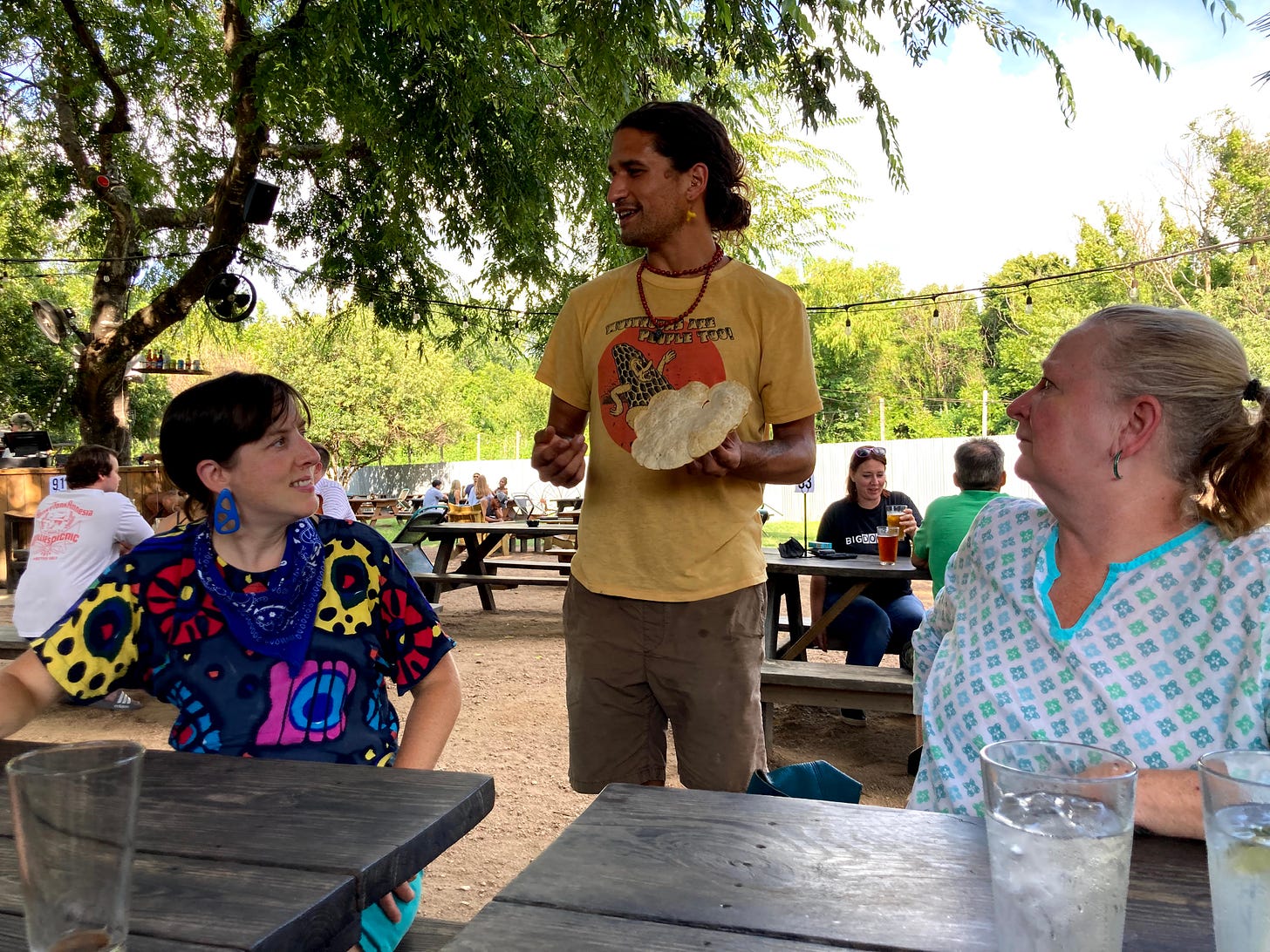
—————————————
I have been eating so many mushrooms this summer!
My boyfriend, Frank, is the real mushroom head in my life. I’ve spritz’d my share of at-home kits over the years, but Frank is now growing mushrooms almost year-round. Glass jars in his kitchen during the winter months, and a new composter-topped stock tank enclosure he set up this summer. (I don’t get how he comes up with this stuff. I’m just there for support.)
While working on this story, I found another fascinating Austin company called Fruiting Body Apothecary, whose founder makes art and tinctures with fungi.
Keep your eyes peeled for new mushroom companies sprouting up (ha) at local farmers markets. You can also find out more about the Central Texas Mycological Society and its upcoming events at centraltexasmycology.org.
One last thing: It will be chicken of the woods season soon, and the group will be hosting walks that will likely take them to parking lots in the city. Schatz says foragers should look out for them on live oaks, especially where their limbs have been trimmed back.
If you see me standing in a grocery store parking lot looking at a tree this October, that’s probably what I’m doing.
Thanks, as always, for your support on Substack.
Don’t forget that new episodes of “Class Reunion: The Podcast” are rolling out each week, and I just announced my fall tarot classes through Don’t Fear the Death Card. Go to dontfearthedeathcard.com if you’re interested or want to book a 1:1 reading!
If you are curious about my tarot work, I just started a new free newsletter called Notes from the Wild Edge to share thoughts on grief, inner resilience and the esoteric. Check it out!
See you next week!
All the best,
Addie



